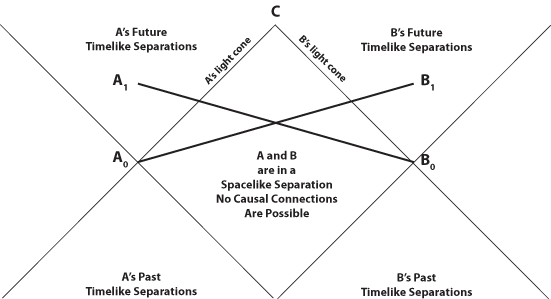C. W. Rietdijk
In 1966, C. W. Rietdijk published "A Rigorous Proof of Determinism Derived from the Special Theory of Relativity." It purports to prove that the world is
pre-determined because of an argument from special relativity called the "relativity of simultaneity."
J. J. C. Smart, a strong determinist, whose 1961
Mind article is one of the canonical sources for the
standard argument against free will, had discussed in 1964 Hermann Minkowski's argument for a
special-relativistic block universe. Smart was circumspect as to whether a "tenseless" view of time means that "the future is already somehow 'laid up' there." He does not yet claim, as does Rietdijk, that everything that is going to happen has already happened, an idea called
actualism.
Rietdijk's argument depends on paradoxes (the most famous being the twin paradox) that result from moving observers having different ideas about what events in their view correspond to "now." They have different "planes of simultaneity." "Now" means they have synchronized their clocks according to Einstein's famous procedure. Rietdijk writes
Our conclusion is: there does not exist an event, that is not already in the past
for some possible distant observer, at the (our) moment that the latter is "now" for
us. Such event is as legitimately past for that distant observer as is the moment five
minutes ago on the sun for us (irrespective of the circumstance that the light of the
sun cannot reach us in a period of five minutes). Only an extreme positivism: "that
which cannot yet be observed does not yet exist", can possibly withstand the conclusion
concerned. Therefore, if we take into account the definition and the argument given
above, we may conclude that there is determinism (which is, of course, not the same
thing as causality), also in micro-physics. Also there is no free will; from this it follows,
e.g., that the whole philosophy of existentialism is untenable. In the same way, of
course, we can conclude that theories, intending to save free will with the aid of
"indeterminism" in micro-physics, cannot be tenable.
"A Rigorous Proof of Determinism Derived from the Special Theory of Relativity,"
Philosophy of Science, Dec., 1966, Vol. 33, No. 4 (Dec., 1966), pp. 341-344
A moving observer B thinks some event in his plane of simultaneous events is in B's future. At the same (cosmic time) moment A thinks that B is in his (A's) plane of simultaneity.

But this is not a transitive relation. Just because A sees B as his "now" and B sees an event in A's future as B's "now" does not make the event in A's future "now" for A.
In his 1989 book
The Emperor's New Mind,
Roger Penrose developed this idea as what he called the "
Andromeda Paradox."
For Teachers
To hide this material, click on the Normal link.
For Scholars
To hide this material, click on the Teacher or Normal link.
Notes
Rietdijk, C.W. (1966) "A Rigorous Proof of Determinism Derived from the Special Theory of Relativity,"
Philosophy of Science, 33 (1966) pp. 341-344
Putnam, H. (1967). "Time and Physical Geometry,"
Journal of Philosophy, 64, (1967) pp.240-247
Being and Becoming in Modern Physics. Stanford Encyclopedia of Philosophy.
Penrose, R. 1989.
The Emperor's New Mind: Concerning Computers, Minds, and Laws of Physics. New York and Oxford: Oxford University Press, pp.191-201.
Grünbaum, A 1963.
Philosophical Problems of Space and Time, Knopf
Lockwood, M.
The Labyrinth of Time, Oxford, 2005, pp.56-61
Bibliography
Normal |
Teacher |
Scholar